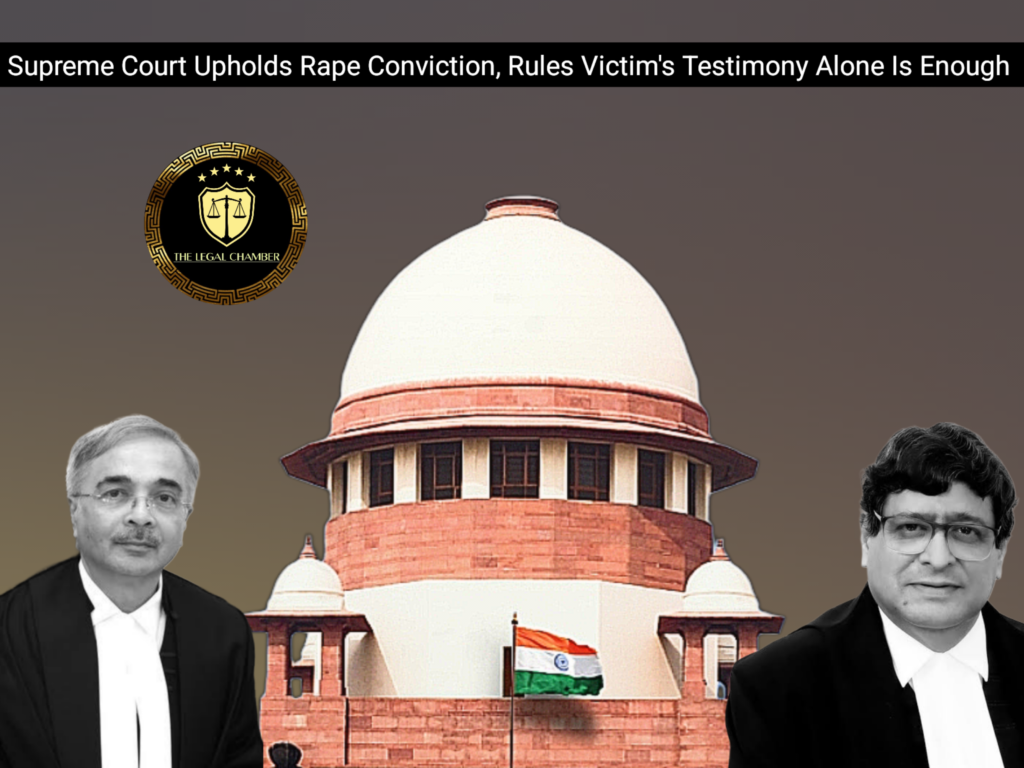
The Supreme Court upheld that a rape conviction can be based solely on the sole, credible testimony of the prosecutrix. Corroboration through medical evidence is not a legal necessity. The absence of injuries does not disprove the offense, especially when the victim’s account is consistent and inspires confidence.
Facts Of The Case:
On April 3, 2018, at approximately noon, a 15-year-old victim and her 11-year-old brother were alone at their home in Rajnandgaon, Chhattisgarh, as their parents had gone to a nearby village to attend a funeral. The appellant-accused, Deepak Kumar Sahu, who was known to the family and lived in the neighbourhood, entered the house. Finding the victim alone, he sent her younger brother away to buy chewing tobacco. Once the brother left, the accused forced the victim onto a cot in the porch of the house, gagged her mouth, and committed rape. Upon the brother’s return, the accused fled the scene, threatening the victim not to disclose the incident to anyone. Immediately after, the victim went to her cousin’s house nearby and informed her sister, Dushyantin. Through a mobile phone, they contacted another relative, Khomendra, who was with the parents, and informed them of the assault. The parents rushed back home, where the victim narrated the entire incident. A police complaint was subsequently lodged, leading to the registration of an FIR and the accused’s arrest.
Procedural History:
The case originated from the judgment of the Special Judge (SC/ST Court), Rajnandgaon, which convicted the appellant under Sections 450 of the IPC and Section 376(2) of the IPC and sentenced him to rigorous imprisonment. The appellant then filed a Criminal Appeal (CRA No. 34 of 2020) in the High Court of Chhattisgarh at Bilaspur. The High Court, in its judgment dated September 22, 2023, upheld the conviction and sentence passed by the trial court. Aggrieved by the High Court’s order, the appellant filed a Special Leave Petition (Crl.) in the Supreme Court, which granted leave and heard the matter as a Criminal Appeal. The Supreme Court, in its judgment dated August 5, 2025, dismissed the appeal and affirmed the decisions of the courts below.
READ ALSO :Technicality or Right? Supreme Court Acquits Man, Rules Mandatory NDPS Procedures Were Ignored
Court Observation:
In its observations, the Supreme Court firmly rejected the appellant’s arguments, upholding the well-established legal principle that the sole testimony of a rape survivor is sufficient for conviction if it is credible and inspires confidence. The Court emphasized that seeking corroboration as a mandatory rule amounts to adding insult to injury. It held that the absence of injuries on the victim’s private parts or emphatic medical evidence is not fatal to the prosecution’s case, as it depends on the facts and circumstances. The Court noted the victim’s testimony was clear, consistent, and natural, and was corroborated by other witnesses, including her younger brother. It further affirmed that minor discrepancies in evidence are not grounds to discard otherwise reliable testimony, especially in sensitive cases of sexual assault.
Final Decision & Judgement:
The Supreme Court dismissed the criminal appeal and affirmed the conviction and sentence imposed by the trial court, which was upheld by the High Court. The Court found no merit in the appellant’s challenges regarding the victim’s minority, alleged discrepancies in witness testimony, or the absence of conclusive medical evidence. It firmly held that the sole, consistent, and credible testimony of the prosecutrix was sufficient to sustain the conviction for rape under Section 376(2) of the IPC. The judgment reinforced that corroboration is not a legal necessity in such cases and that the courts below had correctly appreciated the evidence. The appellant was thus required to undergo the rigorous imprisonment sentenced by the trial court.
Case Details:
Case Title: Deepak Kumar Sahu vs. State of Chhattisgarh Citation: 2025 INSC 929 Date of Judgement: August 5, 2025 Judges/Justice Name: Justice N.V. Anjaria and Justice Sudhanshu Dhulia
Download The Judgement Here